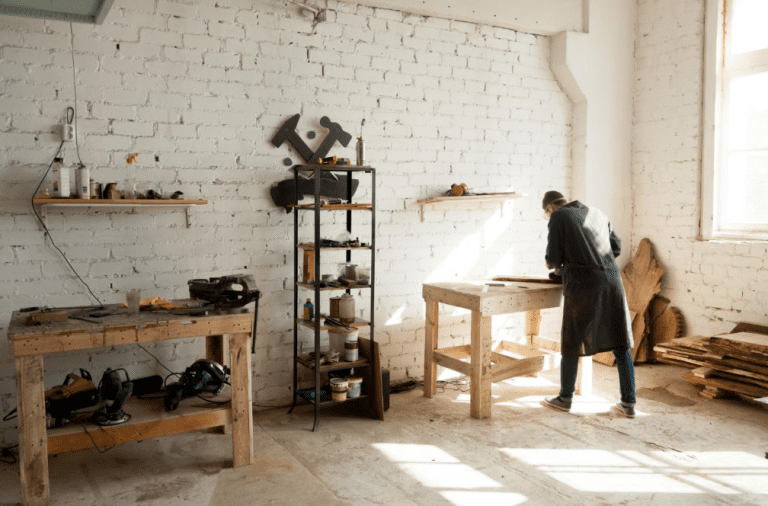Homeownership across the UK has always involved ongoing upkeep, but the role of the home workshop has expanded significantly in recent years. Many households now maintain dedicated spaces for practical tasks, repairs, and hands-on projects. Whether sourcing equipment from Equipment Outfitters or selecting basic tools for everyday maintenance, homeowners are increasingly choosing to handle work themselves rather than rely solely on external contractors. This shift reflects changes in economic considerations, lifestyle preferences, and the evolving way people use their living spaces.
Today’s home workshop is no longer a storage corner for miscellaneous tools. It is becoming a functional and intentional part of residential design.
A Shift Driven by Practical Considerations
The rising cost of professional home repairs and renovations is one of the main reasons more people are turning to DIY. The Office for National Statistics (ONS) has reported sustained increases in labour and materials costs across the home improvement sector, making everyday repairs more expensive. For many households, acquiring the skills and tools needed to perform routine work has become a cost-effective alternative.
This does not mean homeowners are attempting large structural projects or specialist trades without professional support. Instead, DIY activity has grown most significantly in areas such as:
- Routine maintenance
- Minor repairs
- Garden and outdoor upkeep
- Restoration and refinishing
- Storage organisation and space planning
These tasks align well with the scale and capabilities of a domestic workshop.
Changing Attitudes Toward Home Spaces
The way people think about home environments has also changed. During periods of remote work, many individuals reassessed the functionality of their living spaces. Spare rooms, garages, sheds, and outbuildings began to serve more active purposes. What was once storage became a workspace.
This change is visible in broader home and property trends:
- Increased interest in sheds designed for multi-purpose use
- Growth in modular and compact workbench systems
- Higher demand for tools and materials suited to smaller spaces
- Renewed value placed on garages as functional rather than passive spaces
The home workshop has become a space that supports self-sufficiency, convenience, and flexibility.
The Appeal of Developing Practical Skills
Beyond cost and practicality, there is a growing interest in developing skills that feel tangible and useful. Digital work and daily routines can be abstract; manual tasks provide clear results and visible progress. This clarity is appealing.
Learning basic DIY skills offers:
- Greater control over one’s environment
- Reduced reliance on external scheduling and service availability
- Increased confidence in handling unexpected repairs
The skills themselves are incremental. Homeowners often start small, and experience builds gradually. The workshop becomes a space for experimentation rather than performance.
The Role of the Internet in DIY Growth
Image from Freepik
The availability of straightforward instructional content has made DIY significantly more accessible. Tutorials, comparison guides, and troubleshooting communities allow homeowners to learn processes step-by-step, at their own pace. This has reduced the barrier to developing practical abilities.
Importantly, the increase in accessible information does not eliminate the need for professionals. Instead, it enables homeowners to better understand when they can safely handle work themselves and when a licensed specialist is required.
This informed approach helps homeowners make decisions based on awareness rather than assumption.
Tools Designed for Home Use
The growth of the home workshop is also supported by changes in tool availability. Compact, electric, and multi-purpose equipment is increasingly designed for domestic settings. These tools prioritize:
- Manageable weight
- User-friendly controls
- Safety for non-professional operators
- Efficient storage footprints
This makes it realistic for homeowners to perform work that would previously have required access to a commercial workshop.
The ability to store tools effectively and operate them safely is central to long-term use. Home workshops are evolving with this in mind.
Outdoor Work and Garden Management
Garden and outdoor maintenance play a significant role in the resurgence of home workshops. Shrubs, trees, seasonal clearances, and general land care require consistent attention. Having the tools readily available allows homeowners to respond to conditions as needed rather than waiting for scheduled services.
This is particularly relevant in suburban and semi-rural regions where garden areas are larger and seasonal growth is more variable. The workshop becomes a practical extension of the garden, supporting regular, manageable upkeep.
A Cultural Shift Toward Self-Reliance
The return of the home workshop also reflects a broader cultural shift. Many households value being able to maintain their living environments independently. This is not about rejecting professional trades. It is about having enough capability to manage everyday needs confidently.
Self-reliance does not exclude collaboration; it complements it. When homeowners understand the basics, they are able to communicate more effectively with contractors, evaluate quotes, and make informed decisions about larger projects.
This results in better maintenance outcomes and longer-term property resilience.
The modern home workshop is not about taking on complex construction or replacing professional labour. It is about equipping the home with the tools and knowledge to handle the practical routines that come with ownership. As homes increasingly serve multiple purposes, work, living, storage, leisure, functional spaces become essential.
By investing in a workshop and the skills to use it, homeowners can maintain greater control over their environment, reduce avoidable repair costs, and develop a more confident relationship with their property. The home becomes not only a place to live, but a place to engage, repair, and improve.


